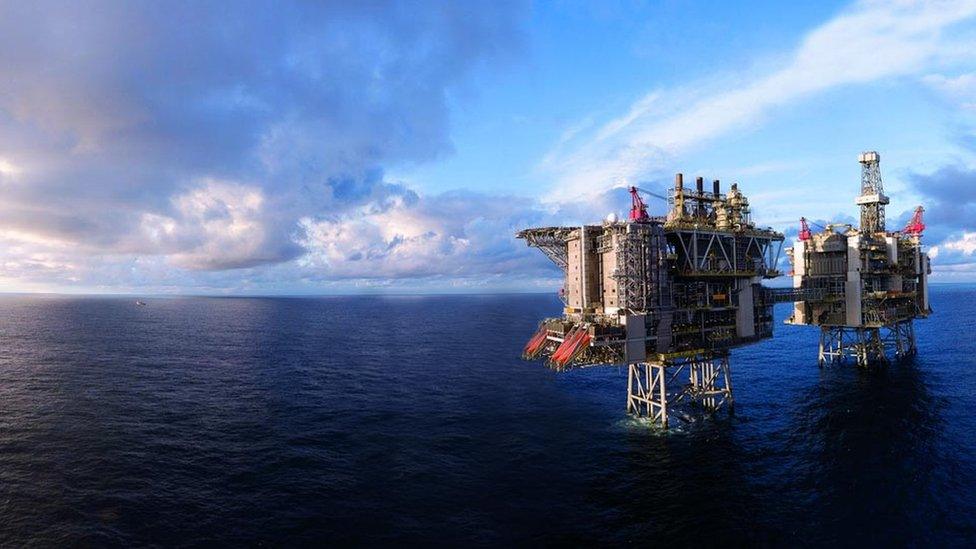Rosebank oil field will boost energy security - Rishi Sunak
- Published
Rishi Sunak says Rosebank will help generate jobs and prosperity for young people in Scotland
A new Scottish oil field will help prevent young people from growing up "dependent on foreign dictators" for energy security, Rishi Sunak has said.
It came after Rosebank off Shetland - Britain's largest untapped oil field - was granted consent by regulators.
Scotland's first minister Humza Yousaf said he was "disappointed" at the decision and accused Downing Street of "climate denial".
The prime minister told BBC Scotland News the Scottish government was wrong.
He said granting the licence to Rosebank was the right move for the country even if he got "flak" for the decision.
"Scotland's North Sea industry is a really important part of its economy and it provides energy security for the UK," Mr Sunak said.
"I don't want our young children to grow up and be dependent on foreign dictators like [Russian president] Putin for our energy.
"I want more offshore wind, I want more nuclear and, in transition, I want more gas that comes from home rather than imported from abroad at two, three times, four times the carbon emissions."
He added: "I think my policy is the right one, not just for Scotland but for the UK. I think the SNP have got this one wrong."
'Climate catastrophe'
Located 80 miles west of Shetland, Rosebank is estimated to contain up to 300 million barrels of oil.
Majority owner Equinor confirmed the oil and gas produced from the site will be sold at world market prices.
Critics, including Humza Yousaf, have said this means the project will not cut prices for UK consumers.
He wrote on X, formerly Twitter: "In the face of a climate catastrophe, the UK government have dropped their green pledges and committed to approving 100 new oil and gas licences.
"That isn't climate leadership. It is climate denial."
The oil and gas regulator, North Sea Transition Authority, said approval had been awarded "in accordance with our published guidance and taking net zero considerations into account throughout the project's lifecycle".
However, climate campaigners have said the decision could be challenged in court, warning that the UK government could breach its legally binding net-zero targets

Meanwhile, environment ministers in Scotland and Wales have called for a UK-wide climate summit following Mr Sunak's net-zero announcements last week.
In a speech from Downing Street, the prime minister pushed back the ban on new petrol and diesel cars to 2035, as well as weakening plans to phase out gas boilers and scrapping the requirement for energy efficiency upgrades for homes.
In a joint letter to Michael Gove - who serves as minister for intergovernmental relations in the UK Government - Scottish Net Zero Secretary Mairi McAllan and Welsh Climate Change Minister Julie James said there was "no prior engagement" with the devolved administrations.
"Given that delivery of the climate ambitions of the four nations of the UK are intrinsically linked, this is deeply unsatisfactory," the letter read.
"In addition, almost a week later, it is hugely frustrating that the UK Government has not provided the level of detail required by such significant announcements.
"We would urge you to provide this immediately to enable devolved governments to fully assess the implications."
Mr Sunak said he "absolutely" respects the Scottish Parliament.
He told BBC Scotland News that he spoke to then first minister Nicola Sturgeon "immediately" after becoming prime minister and was the first prime minister in 15 years to attend the British-Irish Council.
- Published29 July 2023
